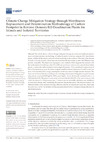Identificador persistente para citar o vincular este elemento:
https://accedacris.ulpgc.es/jspui/handle/10553/77463
| Título: | Climate change mitigation strategy through membranes replacement and determination methodology of carbon footprint in reverse osmosis ro desalination plants for islands and isolated territories | Autores/as: | León Zerpa, Federico Antonio Ramos Martín, Alejandro Mendieta-Pino, Carlos Brito Espino, Saulo Manuel Vaswani Reboso, Jenifer |
Clasificación UNESCO: | 3308 Ingeniería y tecnología del medio ambiente | Palabras clave: | Carbon footprint Ecological footprint Reverse osmosis Desalination Energy consumption, et al. |
Fecha de publicación: | 2021 | Proyectos: | Mitigación del cambio climático a través de la innovación en el ciclo del agua mediante tecnologías bajas en carbono | Publicación seriada: | Water (Switzerland) | Resumen: | This article shows a climate change mitigation strategy by means of membranes replacement and determination methodology of carbon footprint in reverse osmosis (RO) desalination plants, valid for all the islands, and even isolated territories in the continent. This study takes the case of study of Canary Islands, where there are more than 320 desalination plants with different sizes, private, and public. The objective is to propose a new method which integrates this analysis with the replacement of membranes, from 0% to 20% per year in sea water reverse osmosis desalination plants, to reduce the carbon footprint and ecological footprint. If it is considered a replacement of 20% of the elements per year, the carbon footprint could be reduced to between 5% and 6% and even more if it is introduced low energy consumption membranes instead of high rejection elements. The factor mix in Canary Islands, according to the technological structure of the generation park that uses oil products, is around 0.678 kgCO2/kWh, much higher than in the Spanish mainland where it is 0.263 kgCO2/kWh. Therefore, it is estimated in Canary Islands 5,326,963 t CO2/year can be emitted, which represents 2.4 tCO2/person/year, 12 times more the admissible admissions per inhabitant in the Canary Islands, only considering the seawater desalination sector. This document shows the different results of the analysis of energy efficiency and the environmental footprints. This study may serve as a tool for the decision-making processes related to how to improve energy efficiency in desalination plants | URI: | https://accedacris.ulpgc.es/handle/10553/77463 | ISSN: | 2073-4441 | DOI: | 10.3390/w13030293 | Fuente: | Water (Switzerland) [ISSN 2073-4441], v. 13(3) |
| Colección: | Artículos |
Citas SCOPUSTM
18
actualizado el 08-jun-2025
Citas de WEB OF SCIENCETM
Citations
17
actualizado el 08-jun-2025
Visitas
280
actualizado el 01-jun-2024
Descargas
152
actualizado el 01-jun-2024
Google ScholarTM
Verifica
Altmetric
Comparte
Exporta metadatos
Los elementos en ULPGC accedaCRIS están protegidos por derechos de autor con todos los derechos reservados, a menos que se indique lo contrario.
